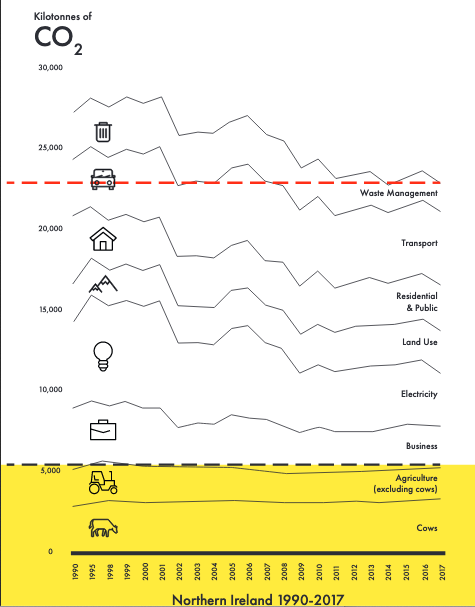The world is in a state of climate emergency. Global solutions are required. Northern Ireland needs to play its part.
In 2018, the UN warned we have 12 years to limit global temperature rises to 1.5C, beyond which the risks of drought, flooding and extreme heat significantly worsen. In May 2019, another UN study concluded that one million species are at risk of extinction due to intensive agriculture, over-fishing, pollution and climate change.
A decade after the UK Climate Change Act, Northern Ireland has set no emissions targets – unlike Scotland and Wales, both of which set their own targets in addition to those for the UK as a whole – and enacted no legislation. Since the Act came into force, emissions here have fallen by just 9% compared with 27% across the UK in general. This is mainly due to reductions in emissions from electricity production and industry, while emissions from transport, residential properties and agriculture have remained largely the same over this time.

We must reduce the gap between the cuts expected of us and those we are making. Northern Ireland needs to modernise, and grasp the opportunities presented by a greener world. We need further development of renewable energy as well as wider schemes to reduce emissions, such as linking agricultural support to reductions in emissions, tree planting, incentives for low-carbon homes, and changing transport habits.
The movement to combat climate change is global, and gaining momentum. Northern Ireland needs to connect itself into this movement and the related debates. Protecting our environment is one of the great concerns of our age. Northern Ireland must take its seat at the table.
The UK Climate Change Act 2008 committed the UK to an 80% reduction in carbon emissions by 2050, compared with the 1990 baseline. Northern Ireland has barely started reducing emissions.

Current level
Northern Ireland has made little progress towards an 80% reduction in CO2emissions. Current emissions from agriculture alone, which have remained steady since 1990, effectively consume the region’s entire allowance.
Total target level

Sources: Peter Donaghy


This Commentary is a section of PIVOTAL’s first report, Moving forward – putting Northern Ireland on track for the future. www.pivotalppf.org/cmsfiles/Publications/Moving-forward-report–printable-version.pdf
PIVOTAL: Northern Ireland’s Public Policy Think Tank. A new future-facing public policy forum, independent of government and unaligned with any political party. The focus is on evidence–based ideas and policies to improve our society, economy and public services.
Twitter: @PivotalPPF


No comments yet, add your own below